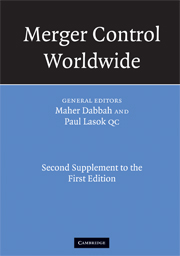Book contents
- Frontmatter
- Contents
- List of contributors
- Table of cases
- Table of legislation
- Introduction to the Second Supplement
- Introduction to the First Supplement
- 1 Argentina
- 2 Armenia
- 3 Australia
- 4 Austria
- 5 Belgium
- 6 Brazil
- 7 Canada
- 8 Chile
- 9 China
- 10 Denmark
- 11 European Union
- 12 Germany
- 13 Greece
- 14 Iceland
- 15 Italy
- 16 Japan
- 17 Republic of Korea
- 18 Malta
- 19 Mexico
- 20 The Netherlands
- 21 New Zealand
- 22 Norway
- 23 Singapore
- 24 Spain
- 25 Switzerland
- 26 Taiwan
- 27 Ukraine
- 28 United Kingdom
- 29 United States of America
- Index
12 - Germany
Published online by Cambridge University Press: 30 July 2009
- Frontmatter
- Contents
- List of contributors
- Table of cases
- Table of legislation
- Introduction to the Second Supplement
- Introduction to the First Supplement
- 1 Argentina
- 2 Armenia
- 3 Australia
- 4 Austria
- 5 Belgium
- 6 Brazil
- 7 Canada
- 8 Chile
- 9 China
- 10 Denmark
- 11 European Union
- 12 Germany
- 13 Greece
- 14 Iceland
- 15 Italy
- 16 Japan
- 17 Republic of Korea
- 18 Malta
- 19 Mexico
- 20 The Netherlands
- 21 New Zealand
- 22 Norway
- 23 Singapore
- 24 Spain
- 25 Switzerland
- 26 Taiwan
- 27 Ukraine
- 28 United Kingdom
- 29 United States of America
- Index
Summary
Relevant legislation and statutory standards
Merger control was introduced in Germany in 1973. The relevant statutory rules are to be found in chapter 7 of the Act Against Restraints of Competition (the “ARC”) (Sections 35 to 43), a statute dating from 1958, as substantially amended in 2005 by the 7th amendment of the ARC, which entered into force on 1 July 2005. The ARC as a whole deals with all kinds of breaches of competition law. The chapter on merger control contains special rules on the relevant thresholds, the definition and the substantive appraisal of concentrations, and notification and reporting obligations, procedures, etc. Otherwise (e.g. as regards the definition of market dominance or participation in procedures) the general provisions of the ARC apply.
With the 7th amendment the ARC has aligned German competition law with the new EC Merger Regulation, Regulation 139/2004. In merger control the 7th amendment brought changes for the temporary relief (see Section 6.4 below) and civil proceedings (see Section 7.2 below). The suggested changes in the media sector have not been implemented in the end (see Section 8.3 below).
Decision-making bodies and enforcement authority(ies)
An updated organisational chart of the FCO is provided in Annex I.
Notification requirements and procedure
Threshold exceptions
Even where parties to a concentration reach the notification thresholds, they are not subject to merger control if the target is an independent undertaking that had less than €10 million turnover in the last business year (so-called “de minimis clause”).
- Type
- Chapter
- Information
- Merger Control WorldwideSecond Supplement to the First Edition, pp. 45 - 51Publisher: Cambridge University PressPrint publication year: 2008



